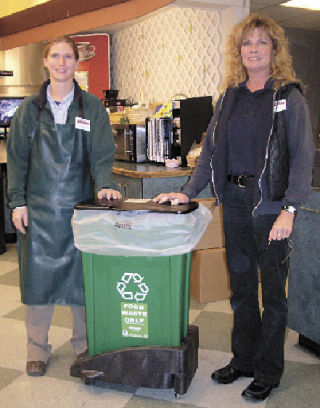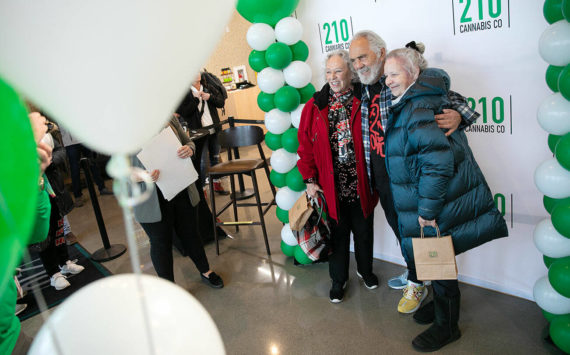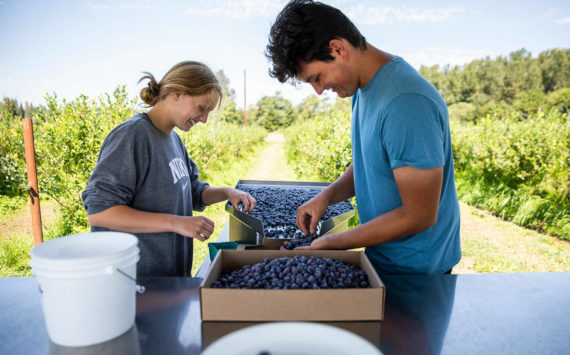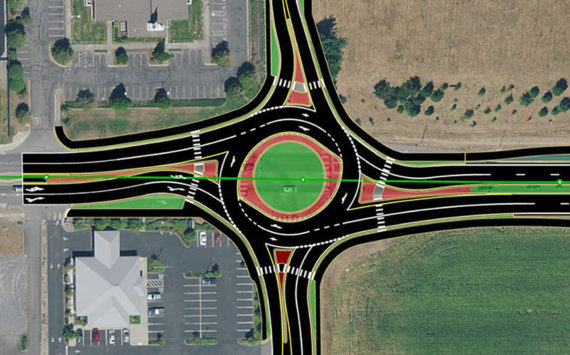ARLINGTON — Businesses in Arlington that serve food might be interested in the savings available through a new program offered by the city of Arlington with assistance from the state Department of Ecology.
A typical restaurant and commercial kitchen waste stream consists of 65 percent compostable organic material, 30 percent recyclables such as cardboard, glass, tin and aluminum cans and 5 percent garbage, according to statistics.
The city first targeted 130 Arlington business and commercial/institutional kitchens with a mailer sent out in June 2008 and have signed up eight participants.
“Our target audience includes restaurants, grocery stores, coffee shops, institutional cafeterias and kitchens of schools, hospitals, senior living communities, and businesses that generate organic waste,” said Jim Kelly, recently promoted from the water treatment business to public works.
The commercial composting program is for organic waste only, including food scraps, food-soiled paper, waxed cardboard, pizza boxes, yard waste, clean wood and other natural and organic material.
Every business that joined this program has been a success story, Kelly said,
Cascade Valley Hospital has been the most eager participant that has fully embraced the program.
After CVH expressed interest in the commercial food waste recycling program, Blue Marble Environmental coordinated a consultation meeting to review their current waste management practices and to introduce the new composting program. After the consultation, Cascade Valley Hospital went from recycling corrugated cardboard to being a full-scale recycler — recycling cardboard, paper, glass, metal and plastic as well as food waste.
“We heard back from Justin Westmoreland of Cedar Grove Recycling after CVH introduced the program to the hospital’s employees at the annual barbecue. They have really increased recycling at the hospital from almost nil to anything they can get their hands on. They did a great job promoting the concept to their employees and most of the ones I witnessed were quite enthused,” Kelly said.
Through the new program, food scraps, yard waste and other organic wastes are recycled into rich garden compost at Cedar Grove Composting in north Everett. Cedar Grove provides a full range of collection services at 10 percent less than solid waste rates. Additionally, as a recycled material, compost is not assessed Washington state refuse tax of 3.6 percent.
To promote this new program the city is offering incentives to businesses. These incentives include first month free composting service, free 23-gallon kitchen containers and a limited supply of biodegradable bags and commercial recycling and composting waste audits by the city’s refuse and recycling consultant Blue Marble Environmental.
Cedar Grove provides promotional materials that advertise a business’ participation as a “green” kitchen, like the one displayed by one of Arlington’s first participants, the Pizza Factory. They have proudly displayed a placard on the counter identifying the business as a compost recycler.
The coffee shop at Arlington Pharmacy, soon to be called Stilly Coffee House, also signed up for the program.
“They started with a 32-gallon cart for their coffee grounds, coffee filters, and leftover unused scones, snacks and some soups,” Kelly said.
At the Thrifty Food Pavilion, they call the program S.O.R.T., trademark for Separate Organics and Recyclables from Trash.
“It’s a three-stream waste sorting system that diverts organic, compostable waste and recyclable waste out of the trash and into their respective waste streams,” said Lucas Henning, the sustainable practices manager for The Markets, LLC.
“We have been able to reduce our landfill use by more than 50 percent at many of our stores,” Henning said.
“Although it’s waste to us, it’s a resource to composters and recyclers, kind of like ‘one man’s junk is another man’s treasure,’” Henning said.
“It’s a win-win situation; we’re reducing the ecological impact from our business and it’s saving us money.”
The Markets LLC has similar programs at its stores in Everett, Anacortes and Bellingham locations and went company-wide at the beginning of this year.
“When I arranged the service at Arlington through waste management and Cedar Grove, the Cedar Grove District Manager Justin Westmoreland informed me of Arlington’s incentive program,” Henning said.
“For many of our team members, sorting waste is already something they’re well versed in, whether it’s composting food scraps for their home gardens or recycling materials at curbside. I was excited to see how responsive our team members were to doing the same thing at work. They take pride in knowing they’re doing good things for both the environment and for the company,” Henning said.
The city presented the program to Arlington School District during its joint meeting at the end of September and Superintendent Kris McDuffy expressed interest.
“We’re all about saving money,” she said. “And being good stewards of the environment, too.”
Working with the district’s public information officer Misti Gilman, they created a plan to first target the kitchen staff and then target the kids in the school cafeteria.
“Everyone from the school district believes the kids will be much easier to train and much more receptive than the kitchen staff,” Kelly said.
Participants also become members of the “Green Scene” — a growing movement of businesses who are working to help reduce waste in our landfills through recycling.








